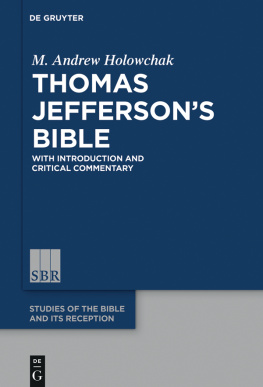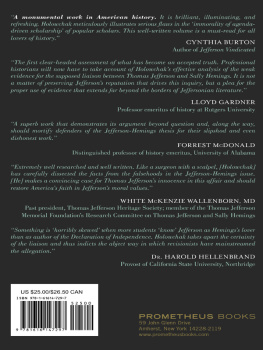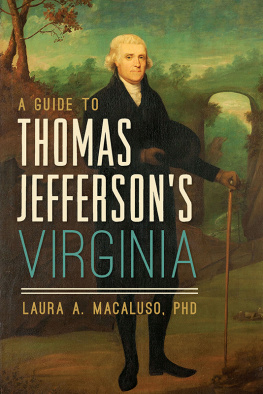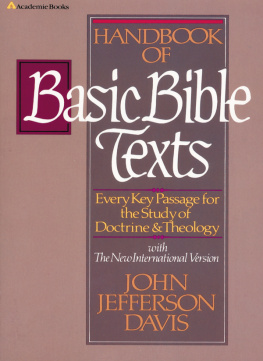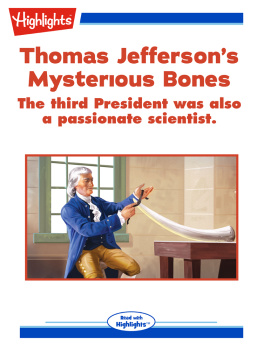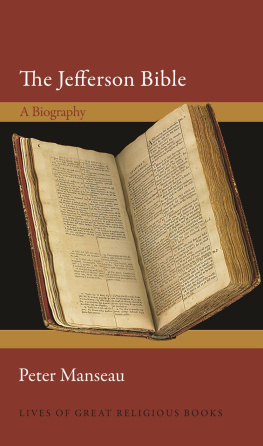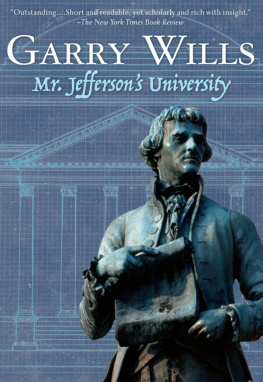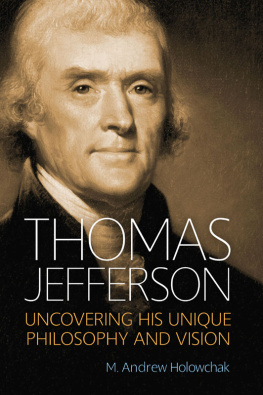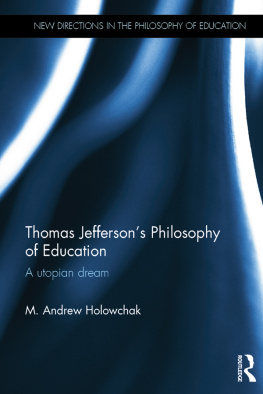Table of Contents
Guide

M. Andrew Holowchak
Thomas Jeffersons Bible
Studies of the Bible
and Its Reception

Edited by
Christine Helmer, Steven McKenzie,
Thomas Rmer, Jens Schrter,
Barry Dov Walfish, and Eric Ziolkowski
Volume 14
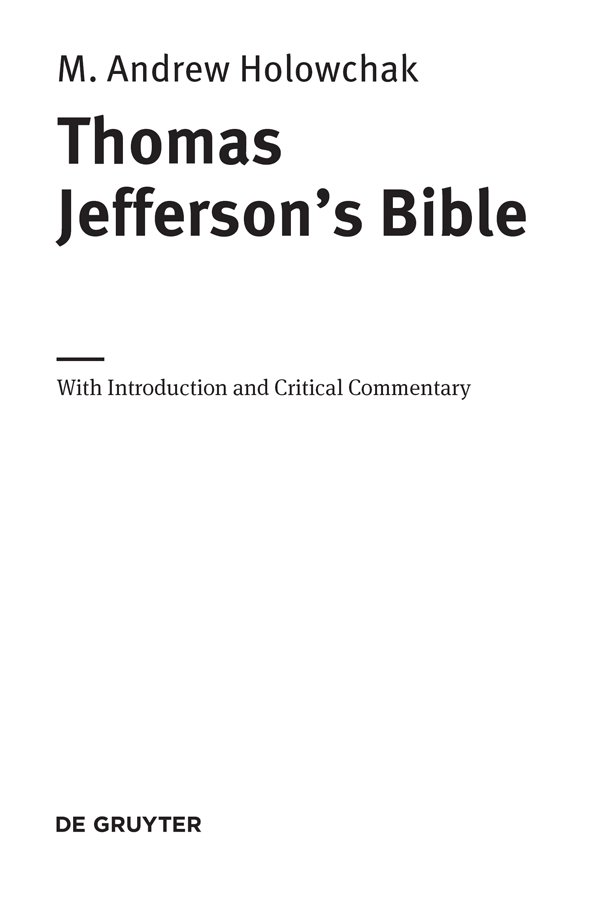
ISBN 978-3-11-061756-6
e-ISBN (PDF) 978-3-11-061984-3
e-ISBN (EPUB) 978-3-11-061910-2
ISSN 2195-450X
Library of Congress Control Number: 2018956859
Bibliographic information published by the Deutsche Nationalbibliothek
The Deutsche Nationalbibliothek lists this publication in the Deutsche Nationalbibliografie; detailed bibliographic data are available in the Internet at http://dnb.dnb.de.
2019 Walter de Gruyter GmbH, Berlin/Boston
Logo: Martin Zech
www.degruyter.com
Preface
W RITES L ORD B OLINGBROKE, as commonplaced by Thomas Jefferson in his Literary Commonplace Book: It is not true that Christ revealed an entire body of ethics, proved to be the law of nature from principles of reason, and reaching all the duties of life. A system thus collected from the writings of antient heathen moralists of Tully, of Seneca, of Epictetus, and others, would be more full, more entire, more coherent, and more clearly deduced from unquestionable principles of knowledge.
Jefferson agreed with Bolingbroke on the incompleteness of Christs teachings. Jesus died in the prime of his years, Jefferson writes in his Syllabus on an Estimate of the Merit of the Doctrines of Jesus, Compared to Those of Others, included in a letter to Dr. Benjamin Rush (21 Apr. 1803), and thus, there were no occasions for developing a complete system of morals. What is worse, Jefferson continues, is that the fragments which have come down to us, disfigured by the corruptions of schismatising followers, are mutilated, misstated, & often unintelligible. In spite of their incompleteness and disfiguration, Jefferson disagreed with Bolingbroke on the lack of fullness and coherency of Jesus moral views and their inferiority to those principles or systems of ancient moralists. He writes, Notwithstanding these disadvantages, a system of morals is presented to us, which, if filled up in the true style and spirit of the rich fragments he left us, would be the most perfect and sublime that has ever been taught by man. The fragments left to posterity, it seems, are so rich, perfect, and sublime that they allow, with some ingenuity, for restoration or reconstruction of a body of ethics, simple yet pure, hence the motivation for Jeffersons own version of the New Testamentwhat is now called Jeffersons Bible, that is, The Life and Morals of Jesus of Nazareth (1820; hereafter, LMJ ).
I have come indirectly to LMJ. With my primary interest being in the philosophical content of Jeffersons writings, I began to study the relationship for Jefferson between religion and philosophy, morality especially, and I became particularly interested in Jeffersons preoccupation with Jesus that began at least a decade prior to his presidency. Why would a person, highly critical of the merits of the New Testament early in life, become obsessed with Jesus and become convinced later in life that Jesus was a great religious reformer and the worlds greatest moralist? Why would such a person create, not once, but twice, his own version of the New Testament, expurgated of its corruptions?
There is a considerable body of literature on Jeffersons religious views and his bible. Much is written about the passages Jefferson selected. The consensus seems to be, I show in the critical commentary, that Jeffersons selection process, guided by his own secularist views of morality, tells us more about Jefferson than about Jesus. That I aim to show is not the case. Jeffersons words and modus agendi concerning the construction of his bible show plainly that he was interested in depicting the historical Jesus, not a Jeffersonian Jesus. In a similar manner, I too am interested in the historical Jefferson, not a Holowchakian Jefferson, and I boldly assert that this book will do much to further our grasps of Jeffersons religiosity as well as of Jefferson the man.
Moreover, of all that has been written, nothing has been written that critically details just how Jefferson plucked out, in his own words, the diamonds from the dunghillsthe actual from false words and deeds of Jesus. Jeffersons letters offer substantive clues to his selection process, but those clues do not tell the whole story. Certain questions go unanswered. Were the avowed principles, mentioned in letters, just those and only just those that Jefferson used to construct his Bible consistent? Furthermore, did Jefferson consistently adhere to them?
The metaphor of plucking out diamonds from dunghills seems to relate neatly to the process Jefferson employed in constructing LMJ. Jefferson literally cut out passages from Bibles of four languages and meticulously glued them on to loose pieces of paper. Yet to answer the questions I have asked, it occurred to me that it is not sufficient to examine the diamonds Jefferson plucked, but also the dunghills from which they were plucked, for the principles Jefferson avowedly employed were both of selection and of deselection. In short, it was not merely a matter of constructing a bible by plucking out diamonds from dunghills, but also a matter of finding diamonds, as it were, by scattering the feculent matter of the heap. One the one hand, it was a matter of recognizing diamonds (selection); on the other, recognizing feculence (deselection). Thus, to get inside Jeffersons mind as he constructed his Bible, it is necessary to study not just what he included in his bible, but also what he excluded from it viz. , just what makes a verse feculent.
That project was on the mind of another, accountant Cari Haus, who in 2009 self-published The Reverse Jefferson Bible. In it, she claims to focus on what Jefferson left out of the Bible. Her intension, however, was otherwisei.e., to underscore Jeffersons irreligiosity by showing that his deterging process was unconscionable and most un-Christian.
In recent years, The Jefferson Bible has become popular among readers who wish to consider the teachings of Jesus outside of His claims to be God. While many atheists and even some Christians see merit in such a study, others point with concern to the warning of Revelation 22:19: And if any man shall take away from the words of the book of this prophecy, God shall take away his part out of the book of life, and out of the holy city, and from the things which are written in this book.
Haus aim, it is clear, was not to advance scholarly understanding of Jefferson through analysis of Jeffersons bible and the passages he omitted, but instead as the quote from Revelations shows, to heap Christian castigation upon Jefferson for having the boldness to tamper with the Bible.
Thomas Jeffersons Bible, With Introduction and a Critical Commentary , is the first attempt at a critical analysis of Jeffersons bible. In letters to select correspondents that pertain to LMJ , Jefferson mentions certain principles of selection/deselection, which he employed in its construction. Yet careful examination of his bible and the verses from the Gospels that were omitted from it shows that he was also guided by certain methodological principles, not inviolably employed. Moreover, Jeffersons account of the life and morals of Jesus was constructed with an eye to improving the literary merits of the workwith an eye to completeness, economy of expression, and smoothness. First, given the material in the four Gospels, he aimed to construct the most complete account, minus redundancies, of Jesus life and teachings. Second, his account was constructed, as was his wont, with due regard for laconic expression. Finally, perusal of LMJ shows a preoccupation with creating a story with flow and continuancy. Thus, LMJ is anything but an incondite rendering of the New Testament. In that regard, he aimed to improve the bible as a literary workno small task.

